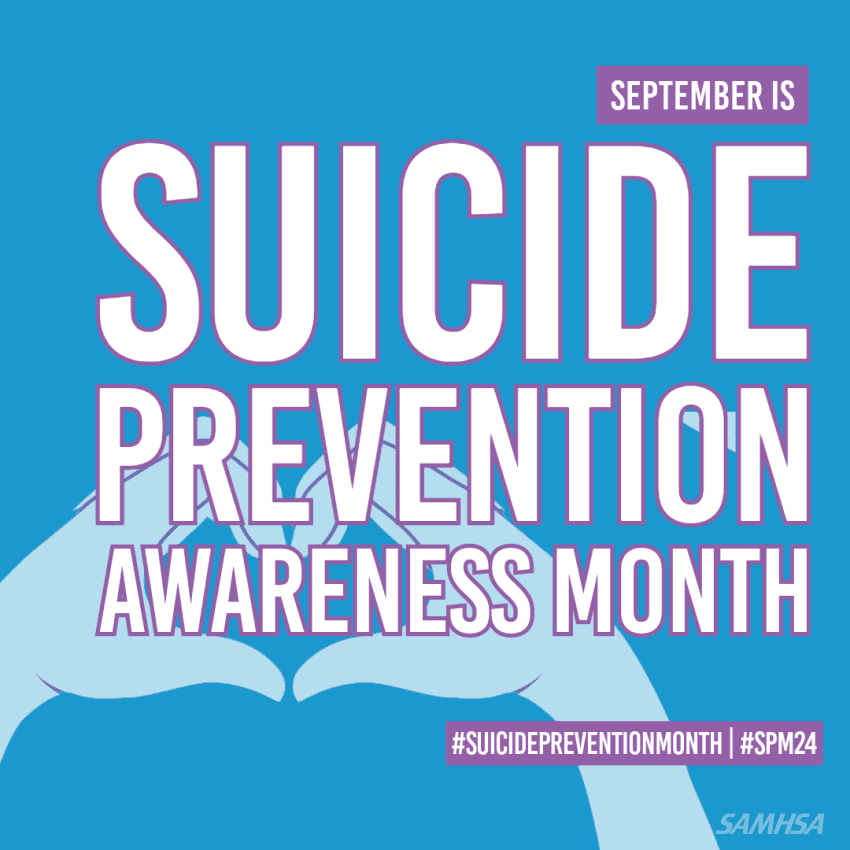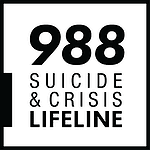September marks National Suicide Prevention Awareness Month, a designated time for communities to come together to raise awareness and provide resources that can help prevent suicide.  Sarah Ermer, the Prevention Specialist at Tillamook Family Counseling Center (TFCC), emphasizes the importance of this month in fostering open conversations about mental health and suicide.
Sarah Ermer, the Prevention Specialist at Tillamook Family Counseling Center (TFCC), emphasizes the importance of this month in fostering open conversations about mental health and suicide.
 Sarah Ermer, the Prevention Specialist at Tillamook Family Counseling Center (TFCC), emphasizes the importance of this month in fostering open conversations about mental health and suicide.
Sarah Ermer, the Prevention Specialist at Tillamook Family Counseling Center (TFCC), emphasizes the importance of this month in fostering open conversations about mental health and suicide.“Suicide Prevention Awareness Month really aims to open a dialogue about suicide and get people talking about it,” Sarah explains. “This helps reduce some of the stigma that comes with discussing mental health and suicide. For anyone who has experienced a suicide loss or struggles themselves, it’s important to recognize they are not alone—there’s a wider community conversation happening, and the community cares.”
Understanding the Risk
Suicide is a global crisis that takes over 800,000 lives every year, according to the World Health Organization. In agricultural communities like Tillamook, the rate of suicide is three times higher than the national average. “There’s a lot of uncertainty around agriculture—so many factors impact livelihood,” Sarah says. Though beneficial for production and work ethic, there’s often a culture of self-reliance which can lead to a reluctance to seek help. Additionally, the accessibility of firearms in agricultural communities increases the risk.
Dispelling Myths and Promoting Awareness
One of the most dangerous misconceptions about suicide is that discussing it will make the situation worse. Sarah is quick to dispel this myth. “One of the big misconceptions is that asking someone about suicide will put the idea in their head. That is well established to be a myth.” She stresses the importance of being proactive if you’re concerned about a loved one. “Ask the question. It shows you are willing to have a difficult conversation – that’s really what QPR (Question, Persuade, Refer) is based on. It goes into more detail on how to have these conversations. If you can, take a QPR course.”
The QPR Gatekeeper training is a community mental health intervention that was listed on SAMSHA’s National Registry of Evidence Based Programs and Practices as an effective suicide prevention training. QPR welcomes people of all backgrounds and knowledge levels, and provides a community space to learn, practice, and empower a deeper understanding of suicide prevention. This training is offered at no cost to members of the community by Sarah, TFCC’s Prevention Specialist.
September Events and Initiatives
Throughout September, TFCC is hosting events to educate and engage the community in suicide prevention efforts.
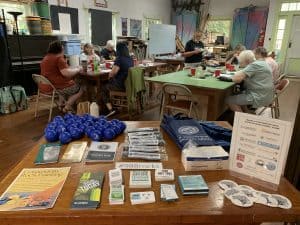
 On Wednesday September 11th, there will be a rock painting event organized by the Tillamook County Suicide Prevention Coalition (TCSPC) at Bay City Arts Center (BCAC) to raise awareness from 6-8pm. Paint positive messages on rocks and learn more about suicide prevention resources. This event is open to people of all ages.
On Wednesday September 11th, there will be a rock painting event organized by the Tillamook County Suicide Prevention Coalition (TCSPC) at Bay City Arts Center (BCAC) to raise awareness from 6-8pm. Paint positive messages on rocks and learn more about suicide prevention resources. This event is open to people of all ages.
- On Thursday September 12th, a QPR Training and Crafts will be held at Tillamook Bay Community College (TBCC). The QPR Training will be from 5-6 PM followed by crafts, snacks, and a chance to connect from 6-7pm. Pre-registration is encouraged, but drop-ins are welcome as well. Go to bit.ly/qprcrafts or email sarahe@tfcc.org to sign up for QPR, crafts, or both.
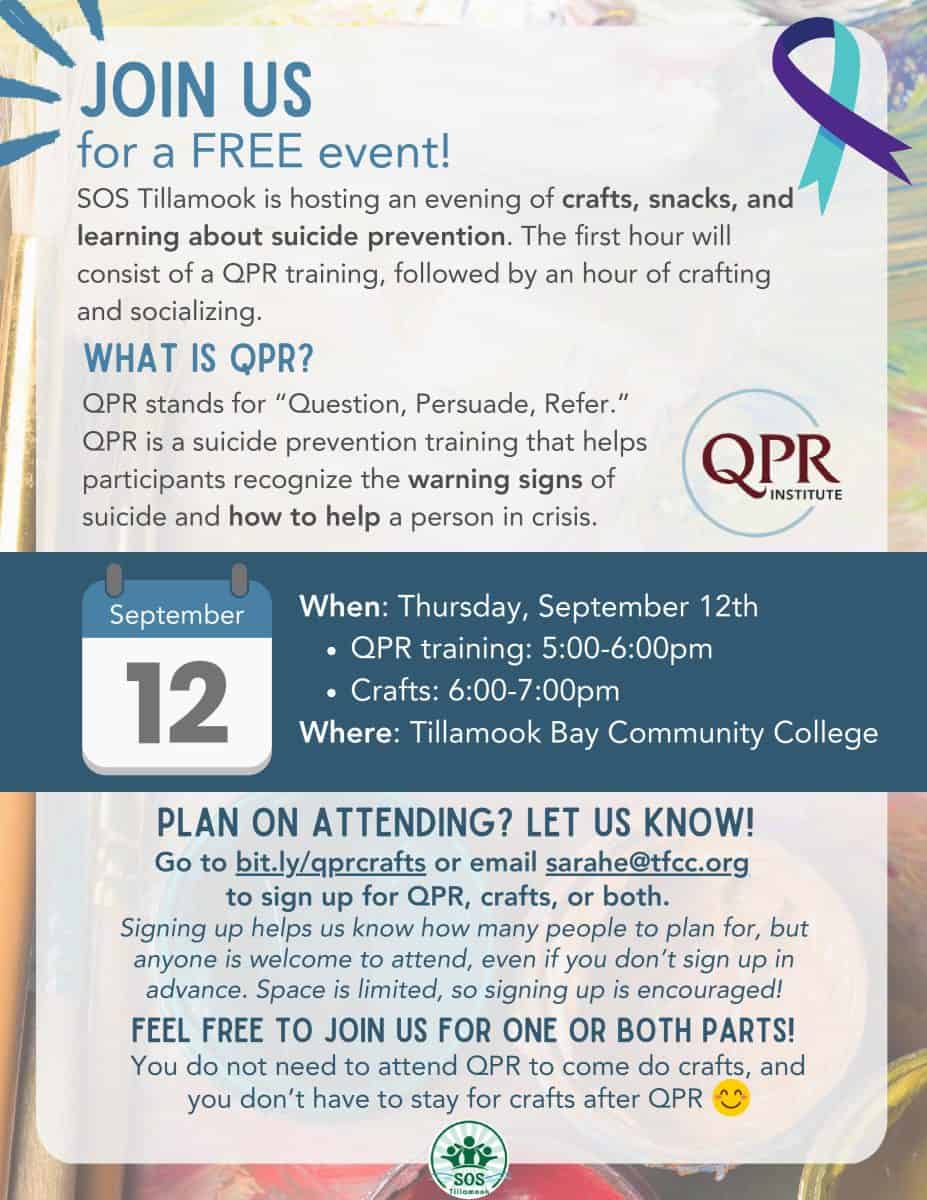
Additional Resources and Support
988 Suicide and Crisis Lifeline is a free, confidential service anyone may call, text, or online chat when experiencing suicidal thoughts or self-harm, a substance use crisis, or any other kind of behavioral health crisis. Calls are available in both English and Spanish.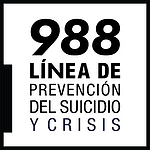
The AgriStress Helpline is a dedicated resource for those in farming, ranching, fisheries, and forestry communities, available 24/7 at 833-897-2474. Calls and texts are answered within 30 seconds, with immediate intervention for those at imminent risk and relevant resources provided to others, along with 24-hour follow-up support.
Taking Action
Suicide prevention is not just about intervening in moments of crisis. “There is an idea in the public health prevention realm that all prevention is suicide prevention. Connecting people to resources for substance use, gambling, or domestic violence before they reach a crisis point is also suicide prevention,” Sarah says. “Just being someone who is willing to listen without judgment and being willing to talk openly and non-judgmentally about mental health can make a huge difference,” Sarah advises.
As we observe Suicide Prevention Awareness Month, let’s foster a supportive community where individuals feel safe discussing their mental health challenges. By recognizing the warning signs, engaging in meaningful conversations, and connecting people with resources, we can make a significant impact in preventing suicide and supporting those in our community.

